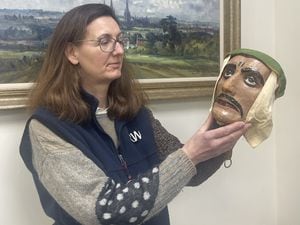Luke Walker: Coroner refuses to question conviction over death of girlfriend Chelsea Hyndman
A coroner has refused to question the conviction of a Black Country man over the death of his girlfriend in Crete - despite hearing expert evidence her injuries could have been caused by a fall.

Jonathan Leach said he could not dispute a Greek trial's findings that Luke Walker, from Brierley Hill, was responsible for the death of Chelsea Hyndman.
Miss Hyndman, who was 20, died on the Greek island in May 2010 after suffering severe abdominal injuries.
Walker was alleged to have beaten her and was initially charged with Miss Hyndman's murder.
UPDATE - Luke Walker's family 'push for judicial review' after findings of Chelsea Hyndman inquest
He had always denied assaulting her and claimed her injuries were the result of a fall.
Walker was kept on the island and sentenced to eight years in prison when the murder charge was downgraded to grievous bodily harm leading to Miss Hyndman's death.
However, the sentence was successfully appealed, meaning Walker would serve no further jail time.
At Miss Hyndman's inquest yesterday, Walker's barrister, Mr Andrew Scott, requested the coroner consider questioning the Greek's court's proceedings when delivering his own verdict into her death.
But Mr Leach refused to do so. However, he decided against a verdict of unlawful killing.
Mr Leach said: "The proceedings were in Greece, a country within the EU, with a democracy and civilisation which goes well beyond our own, therefore the trial can not be criticised.
"I can't make a determination inconsistent with what was found in Greece, where Mr Walker was found guilty.
"It means the only conclusion available to me is unlawful killing and a narrative verdict.
"As a result of blunt force trauma to the abdomen, my conclusion is that of a narrative conclusion."
The inquest had earlier heard from Professor Colin Johnson, a consultant surgeon and specialist on the pancreas, who said if Miss Hyndman had her hand trapped in her belt when she fell, as was suggested by witnesses, it could have been enough to cause the injuries.
But he said it was 'not possible to say one way or the other' if the injuries were caused by an assault or the fall.
The coroner's comments came after Walker, now 29, admitted he wished he had taken his girlfriend, who was from Castleford, West Yorkshire, to hospital sooner.
Speaking at Wakefield Coroner's Court on Tuesday, Walker said: "I would have taken her to hospital sooner.
"I should have made her go. I should have stood my ground and taken her."
The court heard Miss Hyndman had been feeling unwell in the days before being taken to hospital - but Walker said she had refused to go.
Miss Hyndman was admitted to hospital on May 16 with severe stomach pains and jaundice. She had suffered damage to her pancreas which caused multiple organ failure and died the next day.
Walker was arrested over her death and Greek prosecutors claimed he had caused her injuries - but he said she fell on a cobbled street during a night out 11 days before she died.
Walker lived with Miss Hyndman in the holiday resort of Malia.
Statements from her friends suggest jaundice had begun setting in - symptomatic of the damage to her pancreas - around the time Walker had allegedly assaulted her.
The pair had met while working in Malia in 2008 before they began a relationship a year later. Walker was charged with her murder after witnesses described hearing them arguing after a night out in Malia in the early hours of May 12, 2010.
The court in Greece was told neighbours heard shouting and furniture being moved in the couple's room.
After appealing the eight-year jail term, Walker eventually received a three-year suspended sentence.
He later labelled his trial in Greece as a 'farce'.
Following his conviction, his family raised more than £8,500 to pay for his bail, ensuring he could return to the Black Country.
He had been kept in custody for five months after being charged with murder.





